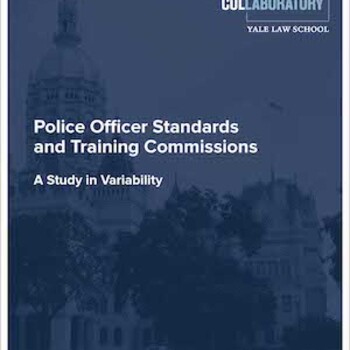The Justice Collaboratory Examines Variability in State Policing Oversight

The Justice Collaboratory at Yale Law School has launched a new project that examines the wide variability among the nation’s Police Officer Standard and Training Commissions (POSTs) — the formal body in each state responsible for regulating or overseeing training and employment standards for law enforcement.
Every state has some version of this kind of body, but they vary substantially in mandate and authority. Some are largely advisory, others perform their functions in perfunctory fashion, and others still are undermined by inadequate funding and resources. But all have the potential to become meaningful agents for cultural change through the establishment and enforcement of departmental standards, officer certification and decertification, and minimum training requirements for both veteran officers and new recruits.

The Justice Collaboratory’s new report uncovers the differences in POST models by reviewing a geographically diverse sample of 20 POSTs. The report looks at the commissions’ key characteristics, including the scope of their mandate, the composition of their membership, the level of representation of non-law enforcement interests among their members, and the regulatory and enforcement authority granted to — or withheld from — them.
“This analysis is critical as we look toward state regulation as the most assured way to improve policing standards and oversight. Ideally, POSTs would not only set minimum employment and training standards, as is the current norm, but would regulate other areas like data transparency, accountability, and use of force,” said Jorge X. Camacho ’10, Clinical Lecturer in Law and Policing, Law, at Yale Law School and Policy Director of the Justice Collaboratory. “POSTs could also make oversight more legitimate through the inclusion of both policing practitioners and community representatives in their membership, something that is currently done only in a few states.”
The Justice Collaboratory intends for this comparative analysis, together with its previously released model POST law, to serve as a helpful guide for those seeking to understand how POSTs should be designed and, once implemented, supported to ensure they meet the expectations of their mandates.
Executive Director Caroline Nobo said that the Justice Collaboratory plans to expand this work to look at POSTs in all 50 states and collaborate with policy makers to “establish a framework and guidance to incorporate the best-in-class features of the most robust POST implementations, including broad authority over officers, training providers, and departments, and the authority to sanction those who fail to meet applicable standards.”
The Justice Collaboratory at Yale Law School is a group of nationally recognized academics, researchers, and social scientists who have joined together to build a more just, effective, and democratic criminal legal system by advancing public policies that are scientifically proven to build strong and safe communities where all citizens can thrive.


